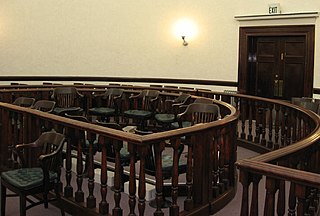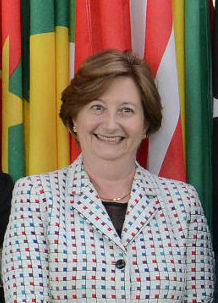Related Research Articles

The International Criminal Court is an intergovernmental organization and international tribunal seated in The Hague, Netherlands. It is the first and only permanent international court with jurisdiction to prosecute individuals for the international crimes of genocide, crimes against humanity, war crimes and the crime of aggression. The ICC is distinct from the International Court of Justice, an organ of the United Nations that hears disputes between states.
A plea bargain is an agreement in criminal law proceedings, whereby the prosecutor provides a concession to the defendant in exchange for a plea of guilt or nolo contendere. This may mean that the defendant will plead guilty to a less serious charge, or to one of the several charges, in return for the dismissal of other charges; or it may mean that the defendant will plead guilty to the original criminal charge in return for a more lenient sentence.

A jury is a sworn body of people (jurors) convened to hear evidence, make findings of fact, and render an impartial verdict officially submitted to them by a court, or to set a penalty or judgment.
Universal jurisdiction is a legal principle that allows states or international organizations to claim criminal jurisdiction over an accused person regardless of where the alleged crime was committed, and regardless of the accused's nationality, country of residence, or any other relation to the prosecuting entity. Crimes prosecuted under universal jurisdiction are considered crimes against all, too serious to tolerate jurisdictional arbitrage. The concept of universal jurisdiction is therefore closely linked to the idea that some international norms are erga omnes, or owed to the entire world community, as well as to the concept of jus cogens – that certain international law obligations are binding on all states.
Gideon v. Wainwright, 372 U.S. 335 (1963), was a landmark U.S. Supreme Court decision in which the Court ruled that the Sixth Amendment of the U.S. Constitution requires U.S. states to provide attorneys to criminal defendants who are unable to afford their own. The case extended the right to counsel, which had been found under the Fifth and Sixth Amendments to impose requirements on the federal government, by imposing those requirements upon the states as well.

A prosecutor is a legal representative of the prosecution in states with either the common law adversarial system or the civil law inquisitorial system. The prosecution is the legal party responsible for presenting the case in a criminal trial against the defendant, an individual accused of breaking the law. Typically, the prosecutor represents the state or the government in the case brought against the accused person.
Trial by media is a phrase popular in the late 20th century and early 21st century to describe the impact of television and newspaper coverage on a person's reputation by creating a widespread perception of guilt or innocence before, or after, a verdict in a court of law. It is particularly relevant in cases where high-profile individuals stand trial, with the concern that the impartiality of the jury may be compromised by extraneous information, disrupting due process and resulting in an unfair trial.
Dickerson v. United States, 530 U.S. 428 (2000), upheld the requirement that the Miranda warning be read to criminal suspects and struck down a federal statute that purported to overrule Miranda v. Arizona (1966).

Article 301 is an article of the Turkish Penal Code making it illegal to insult Turkey, the Turkish nation, Turkish government institutions, or Turkish national heroes such as Mustafa Kemal Atatürk. It took effect on June 1, 2005, and was introduced as part of a package of penal law reform in the process preceding the opening of negotiations for Turkish membership of the European Union (EU), in order to bring Turkey up to EU standards. The original version of the article made it a crime to "insult Turkishness"; on April 30, 2008, the article was amended to change "Turkishness" into "the Turkish nation". Since this article became law, charges have been brought in more than 60 cases, some of which are high-profile.
Bartnicki v. Vopper, 532 U.S. 514 (2001), is a United States Supreme Court case relieving a media defendant of liability for broadcasting a taped conversation of a labor official talking to other union members about a teachers' strike.
Nebraska Press Association v. Stuart, 427 U.S. 539 (1976), was a landmark Supreme Court of the United States decision in which the Court held unconstitutional prior restraints on media coverage during criminal trials.

The Fifth Amendment to the United States Constitution creates several constitutional rights, limiting governmental powers focusing on criminal procedures. It was ratified, along with nine other articles, in 1791 as part of the Bill of Rights.
A private prosecution is a criminal proceeding initiated by an individual private citizen or private organisation instead of by a public prosecutor who represents the state. Private prosecutions are allowed in many jurisdictions under common law, but have become less frequent in modern times as most prosecutions are now handled by professional public prosecutors instead of private individuals who retain barristers.

The Italian Code of Criminal Procedure contains the rules governing criminal procedure in every court in Italy. The Italian legal order adopted four codes since the Italian Unification. After the first two codes, in 1865 and 1913, the Fascist Government established in 1930 a new code adopting an inquisitorial system. In 1988 the Italian Republic adopted a new code, that could be considered to be somewhere in between the inquisitorial system and the adversarial system.

Silvia Alejandra Fernández de Gurmendi is an Argentine lawyer, diplomat and judge. She has been a judge at the International Criminal Court (ICC) since 20 January 2010 and was the first woman President of the ICC from March 2015 to March 2018. She was elected to the presidency for a three-year term and served until March 2018. In 2020 she was elected to serve as President of the Assembly of States Parties to Rome Statute of the International Criminal Court for the twentieth to twenty-second sessions (2021-2023).

The Marshall Court (1801–1835) heard forty-one criminal law cases, slightly more than one per year. Among such cases are United States v. Simms (1803), United States v. More (1805), Ex parte Bollman (1807), United States v. Hudson (1812), Cohens v. Virginia (1821), United States v. Perez (1824), Worcester v. Georgia (1832), and United States v. Wilson (1833).
In the United States, a public defender is a lawyer appointed by the courts and provided by the state or federal governments to represent and advise those who cannot afford to hire a private attorney. Public defenders are full-time attorneys employed by the state or federal governments. The public defender program is one of several types of criminal legal aid in the United States.
McDonnell v. United States, 579 U.S. 550 (2016), was a United States Supreme Court case concerning the appeal of former Virginia Governor Robert F. McDonnell's conviction for honest services fraud and Hobbs Act extortion. At issue on appeal was whether the definition of "official act" within the federal bribery statutes encompassed the actions for which McDonnell had been convicted and whether the jury had been properly instructed on this definition at trial.
Klopfer v. North Carolina, 386 U.S. 213 (1967), was a decision by the United States Supreme Court involving the application of the Speedy Trial Clause of the United States Constitution in state court proceedings. The Sixth Amendment in the Bill of Rights states that in criminal prosecutions "...the accused shall enjoy the right to a speedy trial" In this case, a defendant was tried for trespassing and the initial jury could not reach a verdict. The prosecutor neither dismissed nor reinstated the case but used an unusual procedure to leave it open, potentially indefinitely. Klopfer argued that this denied him his right to a speedy trial. In deciding in his favor, the Supreme Court incorporated the speedy trial protections of the Sixth Amendment against the states.
McDonough v. Smith, 588 U.S. ___ (2019), was a United States Supreme Court case from the October 2018 term. In a 6–3 ruling, the Court held that the 3-year statute of limitations for a fabrication of evidence civil lawsuit under section 1983 of the Civil Rights Act begins to run when the criminal case ends in the plaintiff's favor.
References
- ↑ JM Moses (1995), "Legal Spin Control: Ethics and Advocacy in the Court of Public Opinion", Columbia Law Review, 95 (7): 1811–1856, doi:10.2307/1123196, JSTOR 1123196
- ↑ Haggerty, James (2003), In the court of public opinion : winning your case with public relations
- ↑ Bennett, Robert S. (1996–1997), Press Advocacy and the High-Profile Client, vol. 30, Loy. L. A. L. Rev., p. 13
- ↑ J Marquis (2005), The Myth of Innocence, Journal of Criminal Law and Criminology
- 1 2 The Court of Public Opinion, Duke University School Of Law, September 28–29, 2007
- ↑ Leigh, Monroe (2001), United States and the Statute of Rome, The, vol. 95, Am. J. Int'l L., p. 124
- ↑ JM Bryson; BC Crosby (1993), Policy planning and the design and use of forums, arenas, and courts (PDF)[ permanent dead link ]
- ↑ SA Terilli; SL Splichal; PJ Driscol (2007), Lowering the Bar: Privileged Court Filings as Substitutes for Press Releases in the Court of Public Opinion (PDF), Communication Law